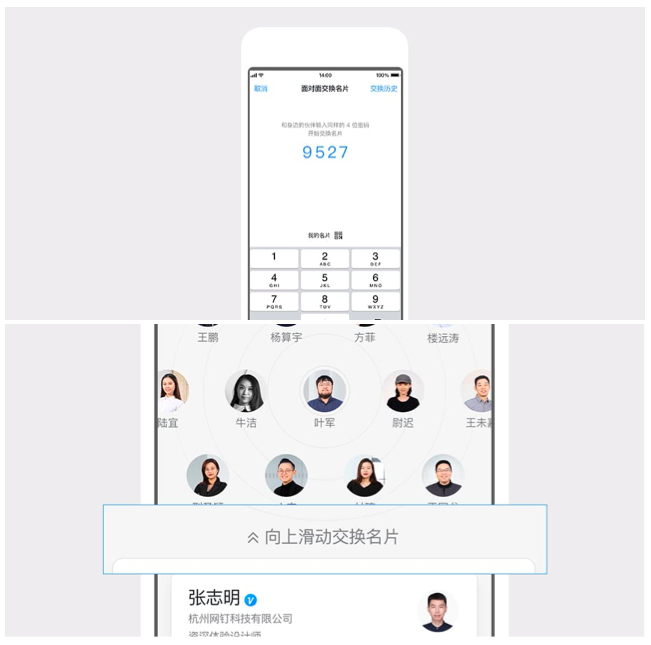
How much time does it take for a room of 1,000 people to exchange business cards? Three seconds, according to DingTalk.
On Monday, Alibaba’s enterprise chat and collaboration app, which has more than 7 million business and organization clients globally, released a new function that lets users exchange digital business cards through a QR code on their smartphone or adding nearby contacts with a four-letter passcode. DingTalk users enter the passcode and then swipe up to share their e-business card with other users within 1 kilometer who have followed the same opt-in process.
“Pack enough people into a meeting, and it can feel like playing ‘drop the handkerchief,’ when we go around in circles to exchange business cards,” said DingTalk founder and CEO Chen Hang, referring to a popular game for “breaking the ice” among strangers.
Through the new feature, users can access their contact database on their mobile phones and organize them into categories, as well as record the date and location when each contact was added to help refresh their memory. They also can edit personal details to keep their contacts updated on their status in real-time. Meanwhile, employers are able to approve and certify each business card with a label, in addition to customizing the layout and linking the cards to an official company page on DingTalk.

Currently the market leader in China among enterprise chat apps, DingTalk focuses its services on the country’s small and medium-sized enterprises as they move from handwritten leave requests and paper-based address books into the digital era. The app offers its users secure one-on-one and group chats, as well as audio and video conferencing, data storage and integration with clients’ internal email systems. And, earlier this year, it expanded its services to include smart hardware such as face-recognition attendance devices and customized solutions for specific sectors such as retail, healthcare, food and beverages and education.
DingTalk also announced a new suite of services created with the mobile-payments app Alipay, owned by Alibaba affiliate Ant Financial. The new tools speed up the reimbursement process for employees while eliminating the need for firms to buy additional expense-processing software. Users scan QR codes to generate e-receipts — which are then automatically saved inside the app — and they can submit reimbursement claims through the app, anytime and anywhere.

Another new bill-splitting feature allows users to share payments. If anyone forgets to pay up, the system sends automated reminders, saving people from any awkward “you owe me money” conversations.
To make it even easier to work on the go, DingTalk also released a collaborative document-editing tool made with Chinese software developer Kingsoft. It allows multiple people to type in and edit Microsoft Word and WPS Office documents at the same time. It also features a meeting-minutes template, which users can fill in and assign tasks to colleagues. Users will receive a personal notification when their name is tagged, and they can go back into the same file to click “task completed” once done.
“Taking organizations, communication, collaboration, business and ecosystems online will shape a new concept of work, where strong-performing individuals will stand out and creativity flourishes,” Chen said. “It enhances organizations overall.”




